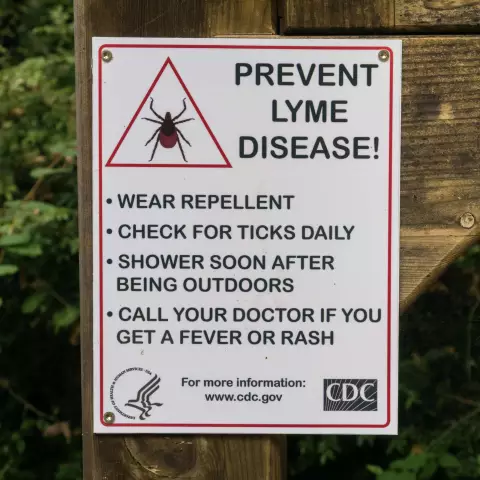- Author Curtis Blomfield blomfield@medicinehelpful.com.
- Public 2023-12-16 20:44.
- Last modified 2025-01-23 17:01.
With the onset of the warm season, many city dwellers go to their dachas, the countryside, or just go for a walk in a park or forest. But they do not always care about their own safety. Every spring, doctors sound the alarm - the population of encephalitis ticks has grown significantly in recent years, so the likelihood of contracting a viral disease through their bite has also increased. What can infect such a tick?

Encephalitis is one of the most common diseases that occur after the bite of this insect. Therefore, it is impossible to neglect security measures. After carefully removing the insect from the skin, you should transfer it to the SES for analysis, and go to the epidemiologist yourself. Of course, you can not do all this, but isn't it easier to stop the disease at an early stage than to be treated for a very long time later?!
Symptoms of encephalitis primarily include severe headache, fever. Excessive sensitivity to light, nausea and vomiting, weakness, drowsiness and general lethargy may also be observed. Signs of encephalitis may appear even after a monthafter a bite. If a person does not see a doctor after the above symptoms appear, they may later suffer from memory loss, hallucinations, personality changes, as well as seizures and excessive arousal.

In severe forms, the disease can even lead to coma and death, so it's best not to ignore the symptoms of encephalitis. If malaise appears almost immediately after the bite, which is growing rapidly, this may indicate that infection has occurred in the most severe form of a viral disease. And even in this case, timely medical care can help the victim to fully recover. The main thing is to urgently see a doctor! After all, in very severe cases, paralysis of one of the hands can be observed.
What to do to avoid danger? First, you can get vaccinated. Vaccination is carried out in 2 stages, the first of which occurs in the fall, you will have to visit the doctor again in early spring. In addition to encephalitis, ticks can be infected with a number of viruses that are much less common. These microorganisms can cause more serious or simply rare diseases: borreliosis or Lyme disease, babesiosis, monocytic ehrlichiosis, and several others. That is why, after detecting a sucking insect, it is imperative to visit the SES and the infectious disease specialist. The consequences of "acquaintance" with a tick may not be obvious, even doctors sometimes mistake them for a protracted SARS. Therefore, it is better not to neglect your he alth and carefully monitor whether symptoms of encephalitis andborreliosis.

Of course, when visiting forests and parks, you need to dress properly. There should be no open areas on the body, shoes should be worn closed. It is better to cover your head with something, and hide your hair. This is especially true for travelers who prefer walking through the Siberian and Far Eastern forests - there the chance of getting infected is very high. And if it happened that you were bitten by a tick and you feel unwell after that, then it is better not to ignore the symptoms of encephalitis and consult a doctor urgently.






